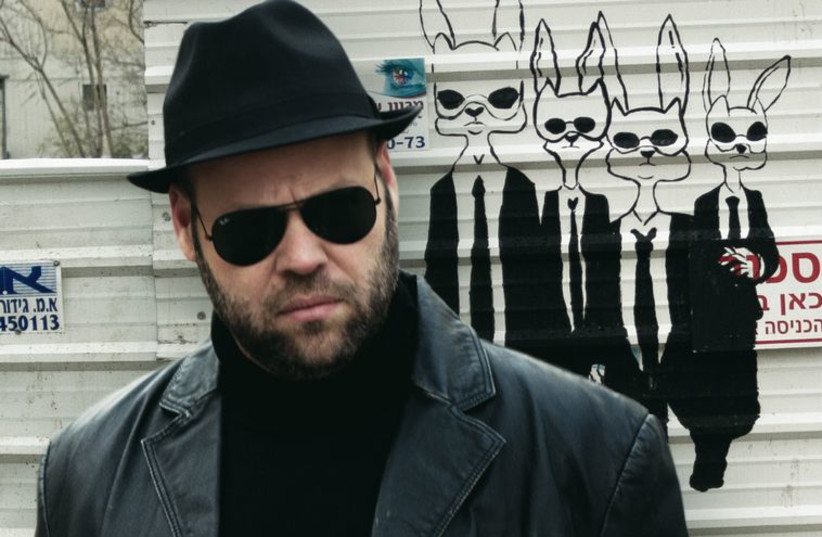Adir Miller is one of Israel’s top standup comics but today, he’s sitting behind a desk, smoking a pipe, wearing reading glasses, with his hair sprayed to look grey.
It’s not a new sketch he’s trying out – he’s in costume for his role as a forgotten novelist in Avi Nesher’s latest film, The Monkey House, which is shooting in Ramat Gan. It was Nesher who sensed Miller’s potential as a dramatic actor and cast him in three key roles in his films, The Secrets (2007), The Wonders (2013) and, most memorably, The Matchmaker (2010), in which Miller played a Holocaust survivor who works as a matchmaker, which won him the Ophir Best Actor Award.
“He’s the best actor in Israel. People say he should do comedy, but I keep telling him, there’s no money in it.”
Avi Nesher
“He’s the best actor in Israel. People say he should do comedy, but I keep telling him, there’s no money in it,” Nesher joked during a break between takes. Miller’s fans, who pack his standup appearances, were likely disappointed to learn that he put the comedy on hold temporarily to take this role, which demands concentration. Miller is also known for his comedy series Ramzor, which was remade in America as Traffic Light, and his more recent series, Miller’s Crossing, both of which play on his persona as a beleaguered everyman.
Asked whether he took the role in this film because he thought there would be monkeys in it, Miller grinned saying, “Yeah, I’ve always wanted to play opposite a monkey.” The title comes from a park where monkeys roam near the home of the main character, a novelist in the late 1980s, who is desperate to revitalize his career. He hires a young woman who dreams of a career as an actress to carry out a strange and dishonest scheme to help him burnish his reputation. That might sound like the beginning of a romantic comedy, but this movie is more of a literary/psychological thriller, with a lot of funny moments (even though there are no monkeys), and Miller is completely credible as the novelist.

My Fair Lady meets Mephisto
“It’s My Fair Lady meets Mephisto, meets a true story,” is how Nesher characterizes the film, and cites Billy Wilder, the great Austrian-Jewish Hollywood director, as an influence on the sharp dialogue and complex situations portrayed in the film. He declined to name the writer on whom Miller’s character is based, but he said it was an open secret in the literary world.
THE SCENES I saw being filmed were all set in the writer’s office in a dusty apartment, filled with posters advertising prizes the writer won decades before, and furniture that had once been stylish but is now threadbare. Crates of unsold copies of the novelist’s works fill the set and cover his desk alongside pulp fiction with trashy-looking covers. His character has written under pen names to pay the bills. No detail has been overlooked on this set, which features an ancient manual typewriter on which Miller’s character types, as he smokes his pipe.
It may be gloomy in here, but it’s very hot out and the most popular person on the set is the woman who comes around with cups of water, carefully retrieving the used cups so none end up in a shot. There is an air conditioner, but it is noisy and takes time to shut down, so it is rarely switched on. In about a week, the production will move to Rome to shoot some key scenes, but for now, the cast and crew are shooting some of the most important sections of the movie in this small, sweltering apartment.
Understandably, Suzanna Papian, who plays the young aspiring actress, takes off the black leather jacket she is wearing between takes – the scene is set in a cooler season. She has appeared in a handful of television shows, including the Netflix series Black Space but this role is her big break. Very pretty, she also projects toughness and resourcefulness. You can believe her as a young woman who has been looking out for herself for a long time and who is ready to do almost anything to make her dreams come true. “The story of Susanna is the ultimate Cinderella story. She’s the least known, least famous person in Israel and he’s the best known, most famous, but she holds her own. She’s going to be a huge star,” Nesher predicted, after she gave a subtle eye roll in response to a fatuous comment by Miller’s character in a take.
Nesher should know. He has a history of taking unknown actors and making them into stars, as well as finding new ways of using well-known actors, such as Miller. Joy Rieger, one of the most in-demand stage and screen actresses in Israel, had her breakout role in Nesher’s 2016 film, Past Life, and went on to star in several more of his movies, including the recent Image of Victory, which will begin streaming on Netflix in Israel and the US on July 15.
He burst onto the Israeli scene when he was just 24 with Ha Lahaka (The Troupe), about the age that Papian is now and he is still a force in filmmaking, making some of his best movies in recent years. “He knows exactly what he wants,” said a crew member, and the filming goes smoothly from scene to scene. His comments to the actors are focused and specific. He and Miller have a kind of shorthand, and he doesn’t need to say much. “Adiri, speak a little more softly,” Nesher says at one point. Looking at both the actors, he says, “It’s a chess match. You’re playing against each other.” They nod and try it again.
